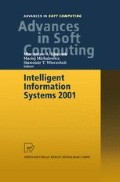Abstract
Research on a new system implementing the AQ learning methodology, called AQ20, is briefly described, and illustrated by initial results from an experimental version. Like its predecessors, AQ20 is a multi purpose learning system for inducing general concepts descriptions from concept examples and counter-examples. AQ20 is viewed as a natural induction system because it aims at producing descriptions that are not only accurate but also easy to understand and interpret. This feature is achieved by representing descriptions in the form of attributional rulesets that have a higher representation power than decision trees or conventional decision rules. Among new features implemented in AQ20 are the ability to handle continuous variables without prior discretization, to control the degree of generality of rules by a continuous parameter, and to generate more than one rule from a star. Initial experimental results from applying AQ20 to selected problems in the UCI repository demonstrate a high utility of the new system.
Access this chapter
Tax calculation will be finalised at checkout
Purchases are for personal use only
Preview
Unable to display preview. Download preview PDF.
References
Cervone, G., Michalski, R.S., Kaufman, K. and Panait, L., “Combining Machine Learning with Evolutionary Computation: Recent Results on LEM,” Proceedings of the Fifth International Workshop on Multistrategy Learning (MSL-2000), Guimarâes, Portugal, pp. 41–58, June, 2000.
Clark, P. and Niblett, T., “The CN2 Induction Algorithm,” Machine Learning 3, pp. 261–283, 1989.
Cohen, W., “Fast Effective Rule Induction,” Proceedings of the Twelfth International Conference on Machine Learning, Lake Tahoe, CA, 1995.
Kaufman, K.A. and Michalski, R.S., “Learning in an Inconsistent World: Rule Selection in STAR,” Reports of the Machine Learning and Inference Laboratory, George Mason University, Fairfax, VA, 2000a (to appear).
Kaufman, K.A. and Michalski, R.S., “An Adjustable Rule Learner for Pattern Discovery Using the AQ Methodology,” Journal of Intelligent Information Systems, 14, pp. 199–216, 2000b.
Lee, S.W. and Michalski, R.S., “ALPE: A System for Automatic Learning Performance Evaluation The Method and User’s Guide,” Reports of the Machine Learning and Inference Laboratory, MLI 97–6, George Mason University, Fairfax, VA, 1997
Michalski, R.S., “Recognition of Total or Partial Symmetry in a Completely or Incompletely Specified Switching Function, ” Proceedings of the IV Congress of the International Federation on Automatic Control (IFAC), Vol. 27 (Finite Automata and Switching Systems), pp. 109–129, Warsaw, June 16–21, 1969a.
Michalski, R.S., “On the Quasi-Optimal Solution of the General Covering Problem,” Proceedings of the V International Symposium on Information Processing (FCIP 69), Bled, Yugoslavia Vol. A3 (Switching Circuits), pp. 125–128, 1969b.
Michalski, R.S., “Synthesis of Optimal and Quasi-Optimal Variable-Valued Logic Formulas,” Proceedings of the 1975 International Symposium on Multiple-Valued Logic,pp. 76–87. Bloomington, Indiana, May 13–16, 1975.
Michalski, R.S, “A Theory and Methodology of Machine Learning, in Michalski, R.S, Carbonell, J.G. and Mitchell, T.M. (Eds.), Machine Learning: An Artificial Intelligence Approach, Tioga Publishing Company, 1983, pp. 83–134.
Michalski, R.S., “Inferential Theory of Learning: Developing Foundations for Multistrategy Learning,” in Michalski, R.S. and. Tecuci, G. (eds.), Machine Learning: A Multistrategy Approach, Vol. IV, Morgan Kaufmann, San Mateo, CA, 1994.
Michalski, R.S., “Natural Induction: A Theory and Methodology,” Reports of the Machine Learning and Inference Laboratory,George Mason University, Fairfax, VA, 2000 (to appear).
Michalski, R.S., and Chilausky, R.L., “Learning By Being Told and Learning From Examples: An Experimental Comparison of the Two Methods of Knowledge Acqusition in the Context of Developing an Expert System for Soybean Disease Diagnosis,” Policy Analysis and Information Systems, Vol. 4, No. 2, 1980.
Pawlak, Z., Rough Sets: Theoretical Aspects of Reasoning about Data, Kluwer Academic Publishers, 1991.
Quinlan, J.R., C4.5: Programs for Machine Learning, Morgan Kaufmann, Los Angeles, CA, 1993.
Zhang, Q., “Knowledge Visualizer: A Software System for Visualizing Data, Patterns and Their Relationships,” Reports of the Machine Learning and Inference Laboratory, MLI 97–14, George Mason University, Fairfax, VA, September, 1997.
Author information
Authors and Affiliations
Editor information
Editors and Affiliations
Rights and permissions
Copyright information
© 2001 Springer-Verlag Berlin Heidelberg
About this paper
Cite this paper
Cervone, G., Panait, L., Michalski, R. (2001). The Development of the AQ20 Learning System and Initial Experiments. In: Kłopotek, M.A., Michalewicz, M., Wierzchoń, S.T. (eds) Intelligent Information Systems 2001. Advances in Intelligent and Soft Computing, vol 10. Physica, Heidelberg. https://doi.org/10.1007/978-3-7908-1813-0_2
Download citation
DOI: https://doi.org/10.1007/978-3-7908-1813-0_2
Publisher Name: Physica, Heidelberg
Print ISBN: 978-3-7908-1407-1
Online ISBN: 978-3-7908-1813-0
eBook Packages: Springer Book Archive

